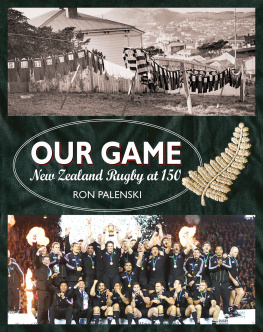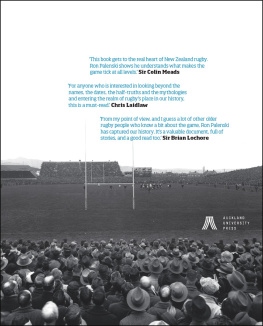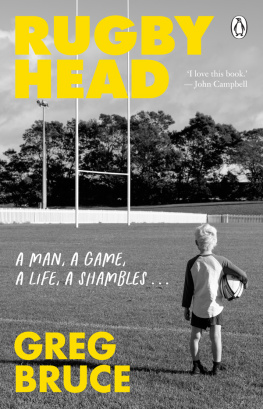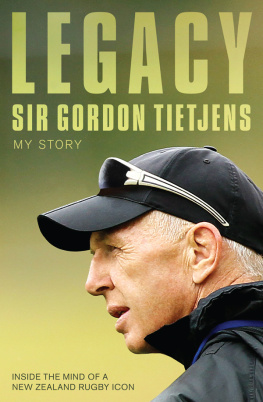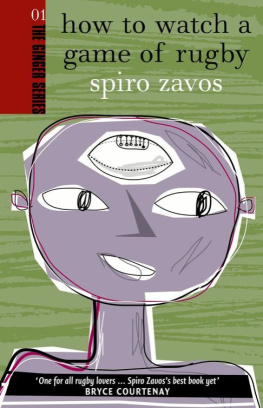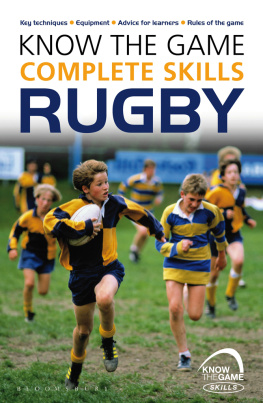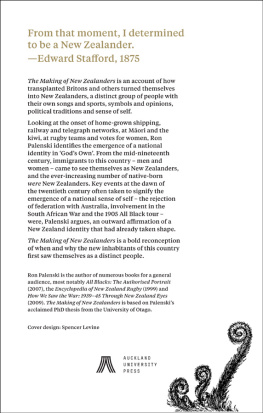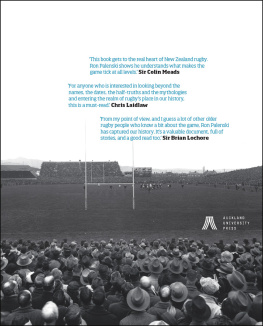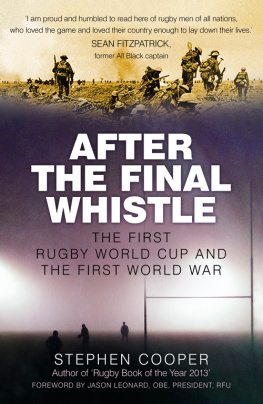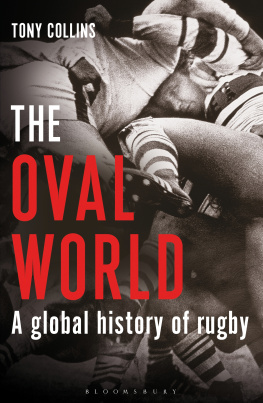Ron Palenski - Our Game: New Zealand Rugby At 150
Here you can read online Ron Palenski - Our Game: New Zealand Rugby At 150 full text of the book (entire story) in english for free. Download pdf and epub, get meaning, cover and reviews about this ebook. year: 2020, publisher: Upstart Press, genre: Politics. Description of the work, (preface) as well as reviews are available. Best literature library LitArk.com created for fans of good reading and offers a wide selection of genres:
Romance novel
Science fiction
Adventure
Detective
Science
History
Home and family
Prose
Art
Politics
Computer
Non-fiction
Religion
Business
Children
Humor
Choose a favorite category and find really read worthwhile books. Enjoy immersion in the world of imagination, feel the emotions of the characters or learn something new for yourself, make an fascinating discovery.
- Book:Our Game: New Zealand Rugby At 150
- Author:
- Publisher:Upstart Press
- Genre:
- Year:2020
- Rating:4 / 5
- Favourites:Add to favourites
- Your mark:
- 80
- 1
- 2
- 3
- 4
- 5
Our Game: New Zealand Rugby At 150: summary, description and annotation
We offer to read an annotation, description, summary or preface (depends on what the author of the book "Our Game: New Zealand Rugby At 150" wrote himself). If you haven't found the necessary information about the book — write in the comments, we will try to find it.
Our Game: New Zealand Rugby At 150 — read online for free the complete book (whole text) full work
Below is the text of the book, divided by pages. System saving the place of the last page read, allows you to conveniently read the book "Our Game: New Zealand Rugby At 150" online for free, without having to search again every time where you left off. Put a bookmark, and you can go to the page where you finished reading at any time.
Font size:
Interval:
Bookmark:
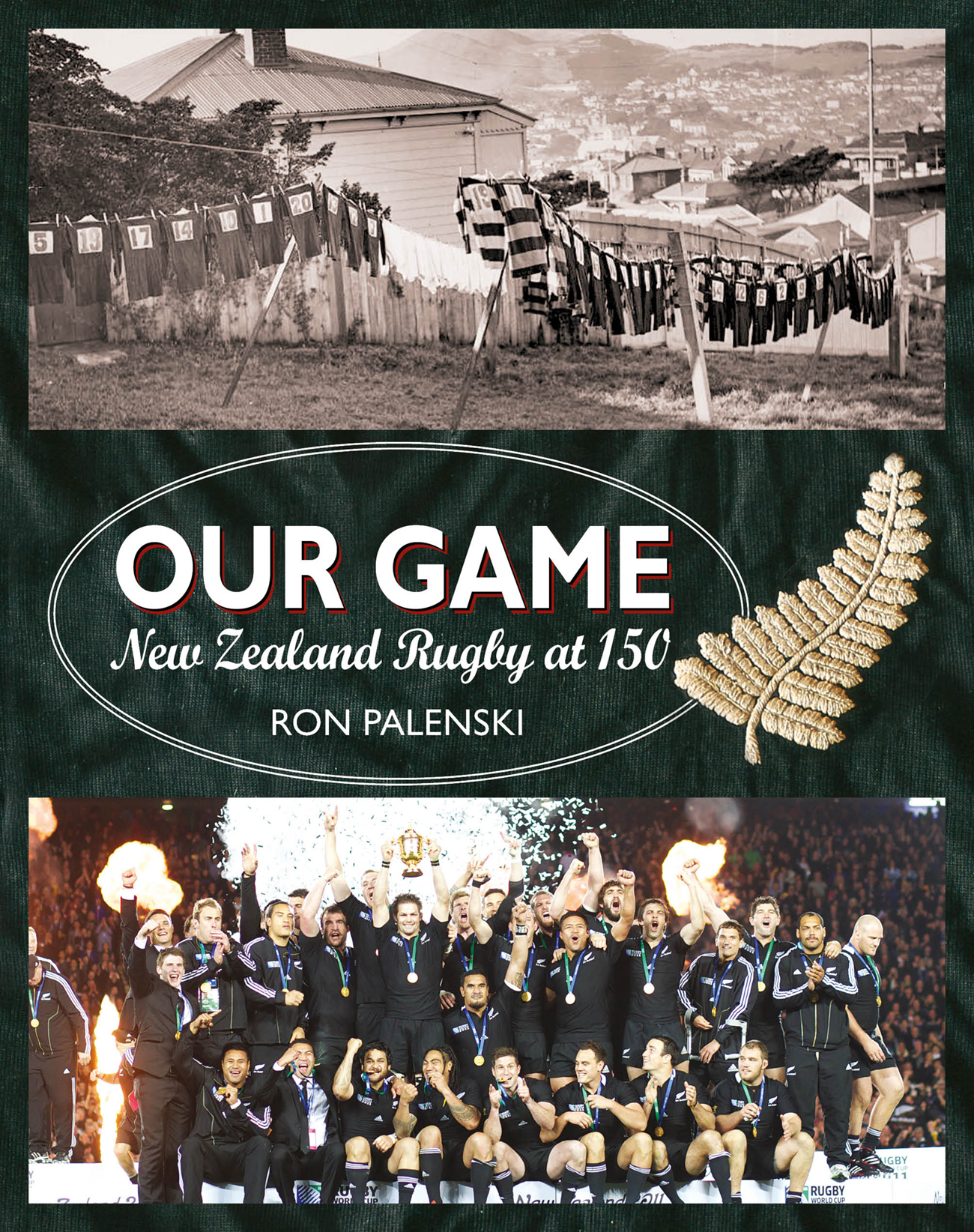
A catalogue record for this book is available from the National Library of New Zealand
ISBN e: 978-1-990003-06-6
ISBN m: 978-1-990003-07-3
A Mower Book
Published in 2020 by Upstart Press Ltd
Level 6, BDO Tower, 1921 Como St, Takapuna 0622
Auckland, New Zealand
Text Ron Palenski 2020
The moral rights of the author have been asserted.
Design and format Upstart Press Ltd 2020
All rights reserved. No part of this publication may be reproduced or transmitted in any form or by any means, elec tronic or mechanical, including photocopying, recording, or any information storage and retrieval system, without permission in writing from the publisher.
Design by CVD Limited www.cvdgraphics.nz
To those who first decided rugby would be New Zealands game... and those who passed it on.
Introduction
A couple of long manuka branches, one end sharpened and stuck in the ground; another branch serving as a crossbar, lashed to the uprights with strips of flax. Jerseys, coats placed carefully on the ground to mark the lines of touch. Sheep cleared out of the way.
In the towns, the gutters are the touchlines. A chalk line across the road serves as the goal-line. The local cop frowns at posts in the middle of the road so no goals. Only tries count. If cars approach, the move stops until theyre gone then the move resumes.
At the citys big rugby ground, the groundsman is out at first light marking out the white lines, pushing what looks like a lawnmower with a paint pot on top. The scoreboard is made ready. The home team name, painted in white on black-painted plywood, goes up first. Then one that just says Visitors. At some more sophisticated grounds, the actual team name is used.
In a hotel somewhere, players gather for lunch. They dont talk much; just eat and wait for the time the coach or the captain stands and tells them whats required of them that afternoon. The words are simple and straightforward but heartfelt. Theres no St Crispins Day speeches, no From this day to the ending of the world, but we in it shall be remembered.
Players file into the sheds, putting bags down at their usual spots, then outside for a sniff of the air, a look at the ground, toss a bit of turf in the air to test the wind. Then back inside. The slow ritual of dressing for the arena. Some don their knights armour in a specific order right sock, left sock, jersey. Others dont bother. Some seek a rub from the masseur, whos probably the butcher during the week, others just slap a bit of oil of wintergreen on their legs themselves. For most, the boots go on last. They stamp down on the concrete, just to make sure all is well. If they have to wait, they jog up and down on the spot; when the whole team does it, it sends shivers down rugby spines.
The referee, clad all in white, pokes his head in the door. Okay, time to go, he might say.
Out into the wintry sunlight. Out into the roar. Or perhaps just polite applause. The game is to begin. The games the thing.
Thats rugby. Times, fashions, attitudes and demands change, the boy who plays in the street could grow up to be the focus of all eyes on the international arena; those who play in the back paddock could one day find themselves at Twickenham or Murrayfield or any of the other great rugby venues around the world.
Rugby is New Zealands game. It has been for at least 150 years, probably for a year or two longer. Other sports were first organised around the same time in New Zealand, a period when the reach of the railways and the telegraph made people more aware of what else was happening in their land. But no other developed quite like rugby, no other captured such a hold on a young country that it was never to be loosened.
You can pick a countrys game when driving. You see the playing fields and you know what sports are played there. The soccer goalposts in most countries. The four upright posts in Australia that denote their unique game. Baseball diamonds in the United States. Rugby goalposts. You see them more in New Zealand; perhaps only Wales could match it.
Rugby also has a hidden element, a part that goes beyond the television and radio coverage, the acres that used to be in newspapers and which now gets spread around online. The hidden part is the knowledge that a great many New Zealanders have of the game and how they love getting together to learn more or to share their knowledge. There are grown-ups who take pride in being able to name every member of a touring side from their youth; there are others who can remember scores. Eras define their memories. Older people may talk nostalgically of 1956 or 1959 or the golden era of the 1960s; younger ones have their recall conditioned by the professional era, who talk proudly of having seen Jonah Lomu. Some people live in houses crammed with rugby memorabilia; others have rooms devoted to All Blacks players jerseys theyve bought.
New Zealand provincial government was abolished in 1876 but provincial parochialism continues to define rugby followers. There are those who recall great eras for their provincial teams and even more remember great players and are blinkered to the claims of others.
And its not just a mans game. Never was. Mothers, sisters, girlfriends followed their males and followed their game; some more passionately than the men. Find the oldest photo of a rugby crowd and chances are there will be women in the crowd. Some clubs and provincial unions used to have special seating areas for women, so as to protect them from the rougher, rowdier elements. Young women probably played the game informally from the beginning; there certainly was an attempt to form a womens professional team in the nineteenth century, long before men had the same idea.
Rugby is a game of the people, unlike in some countries. Whether left wing or right, socialist or capitalist, labourer or lawyer, its all the same to rugby. As a chief justice, Sir Richard Wild, said when speaking at the seventy-fifth anniversary of the New Zealand union, Theres no yielding to status in a rugby tackle, theres no privilege in a scrum.
To many New Zealanders, the much-quoted words of John Mulgan still ring true: Rugby football was the best of all our pleasures.
What follows are 150 stories on aspects of New Zealand rugby; if theres a heavy emphasis on the All Blacks, thats because the country emphasises the All Blacks. They are the pinnacle. They are the apex of the pyramid whose base is all New Zealanders.
First game
A small advertisement appeared in the Wanganui Herald on 2 June 1869: Foot-Ball Match, it said. Country v Town. Town accepts the Countrys Challenge, provided the Rugby Rules are attended to. Game to commence at 2 oclock pm on Saturday, 12th inst. 2 June 1869.
Its the first known indication of rugby being played in New Zealand. The game was postponed from 12 June and eventually took place the following week, with both the Herald and its tri-weekly contemporary, the Chronicle, reporting on it (and others later in the year).
The Herald , the paper founded by later prime minister John Ballance, reported: a football match was going on between fifteen of the town and same number of the country. The match was very well contested and after two hours hard kicking was withdrawn, rain and darkness coming on. The match will be resumed on Saturday week.
It was clear rugby rules were attended to, as the advertisement wanted, by the Chronicle s report: The foot-ball match on Saturday was not terminated when night-fall brought the game to a termination. The country side, however, seemed to have the best of it, having had the ball in the neighbourhood of their goal for some considerable time, but were unable to kick it over the horizontal bar. The match is thus postponed for a fortnight.
Font size:
Interval:
Bookmark:
Similar books «Our Game: New Zealand Rugby At 150»
Look at similar books to Our Game: New Zealand Rugby At 150. We have selected literature similar in name and meaning in the hope of providing readers with more options to find new, interesting, not yet read works.
Discussion, reviews of the book Our Game: New Zealand Rugby At 150 and just readers' own opinions. Leave your comments, write what you think about the work, its meaning or the main characters. Specify what exactly you liked and what you didn't like, and why you think so.

